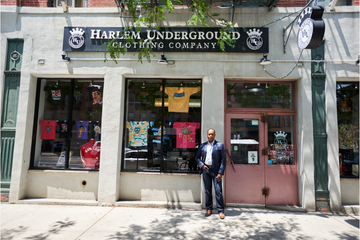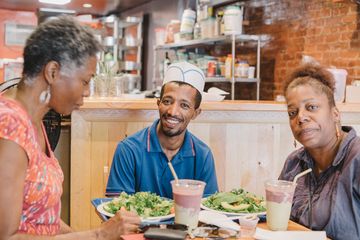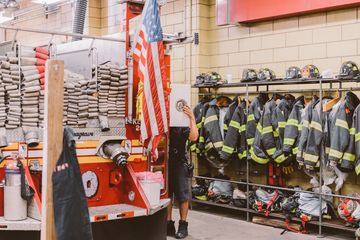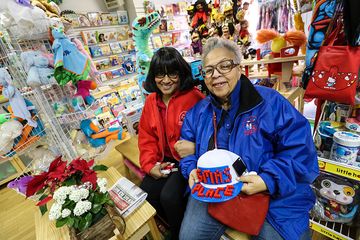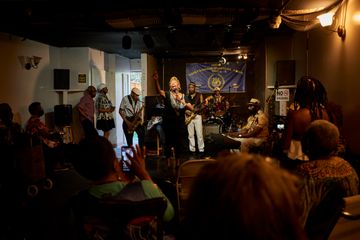People do not only stop into Grandma's Place to pick up a gift for a birthday party, or something special for their own child. During my visits, on several occasions, it seemed that the entire neighborhood was dropping by simply to receive a warm hug from Dawn Harris-Martine, and possibly sticking around a bit longer to entertain their little ones, or share some local gossip with the owner of this remarkable staple on 120th Street. Without a doubt, Dawn has earned the beloved title of "Grandmother of the neighborhood. "Discovering this children's educational toy and book shop, was totally unexpected. There was nothing to indicate that tucked away, just off Lenox Avenue, I was about to come upon this incredible Harlem hidden gem. Being a grandmother of three, myself, was enough to make me want to venture in, but having also owned my own children's book store, I was absolutely thrilled to look through every inch of space in this welcoming, well-curated collection of items for children of all ages. Kids are encouraged to play, to look through the books, and little ones are enthralled by being able to take the mini shopping cart and fill it up with different items that they can reach and take for a whirl through the space. Dawn and her pleasant staff never seem to mind and parents, in turn, are respectful of their child's play. From board books, to picture books, beginning readers and chapter books, there is something for every child at Grandma's - with a strong representation of both current and classic multi-cultural titles. There is also a wonderful section of non-book items. The shelves are filled with dolls, stuffed animals, puzzles, craft kits, bath toys and a selection for babies. Dawn told me that she is constantly on the lookout for things that are not sold in the big chains. "Since I opened, I have always felt that I must have a reason for my customer to want to shop in my store. "Right next door to the shop, Dawn owns the brownstone where children's books are wall-to-wall including the bathrooms. On February 28th, 1982, Dawn "won" the brownstone where she resides - in the first New York City lottery. She paid $5000 for what she described as just a shell with no roof. "But I had a vision. " Partially funded with a loan from the City, Dawn made it into a duplex. "Since this was a gift to me, I had to give back. " Today, she continues to donate to shelters and to give books to local day care centers. Originally, in 1999, Dawn used the space next door to her home as a literacy center. She stayed with this concept for five years and then transitioned into a children's book store. "I was doing this as a school teacher and I realized that I could not stay in business this way. " In 2006, she made the decision to add toys and dolls. "My thing was ethnic dolls, and I found a woman in Florida who made them based on the picture of a child. " Dawn has watched the business continue to grow the last few years as the area has become more gentrified. There have been more and more people moving uptown and they have helped her to stay in business. Sitting in her 100 year old rocking chair, during the winter of 2016, Dawn revealed endless stories of her own childhood and those who impacted her seventy-seven years. She was born and raised in Harlem. "Every phase of my life I believe influenced me in so many ways. "As a child, Dawn never had toys of her own. "Each holiday, I got a piece of clothing and fruit - I was never given a toy in my life. " When she was twenty-one, however, she bought herself a GI Joe doll. She then became hooked on collecting toys. "I always wanted a toy store in the back of my head, but I never really intended on doing it. "Listening to the description of her childhood, I learned that Dawn taught herself to read. In fact, she said that she raised herself, for her mom had three jobs. "My babysitter was the public library. " It was Dawn's older sister who dropped her off each day at the library where Dawn read until her sister returned for her. "I read every children's book and then the librarian allowed me to move onto the adult section... I raised myself through parenting books, including Dr. Spock. " Books became her best friends. If she read about skiing, she figured out how to get on a bus and try it. As Dawn got older, if she read about Puerto Rico, she managed to find the money to get on a plane and visit there. "I went on my own and just met people wherever I went. I didn't know that I wasn't allowed to do the things that I did, so I just did them. "Dawn was the first in her family to go to college, "My mother was a chamber maid and my father was a barber. " As she described her situation, "I was blessed with intelligence and blessed with teachers who recognized my intelligence. I came through the school system loving learning and loving reading. " In 1957, Dawn graduated high school, but it was not until 1970, when she won a scholarship, that she was able to attend Sarah Lawrence College. After college, for the next forty years, Dawn was a teacher in Harlem. Continuing on, Dawn expressed herself with great emotion. "I am a conduit - I feel it is my responsibility to pass this on to others. I want other black parents to know who are raising kids alone to stay on point and know that they can do it. Things that are thrown at you are not reasons to give up, but rather get back on track. "Her words of wisdom have certainly resonated with many in her life. Her own two daughters have gone on to become successful in their careers, and she is quite proud of her two granddaughters. They both are attending college while also working at Grandma's Place, and one even lives with Dawn. "It is the destination not the journey - the destination is the gravy, where you start and how you get there is what matters. We all have challenges but we manage and can be successful. " To young people today, Dawn's message is a simple one. "I want them to follow their passion, for what's the worst that could happen? "On a subsequent visit, I had the pleasure of meeting Grandma Annette. She was the quintessential example of why Grandma's Place runs so beautifully. "I am the volunteer and good friend who comes every once in a while when needed. " She exudes love and warmth to each person - big or small - that steps into the shop. And as Dawn, herself, so eloquently chimed in, "It is always good to have a grandma in the house. "
